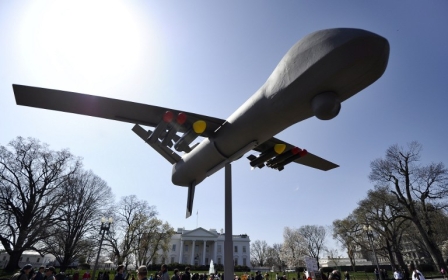Moved by Paris attacks, former US drone operators speak out

America's use of drones to target suspected militants around the world is driving hatred toward the United States and causing further radicalisation, four former airmen have said in the wake of the deadly Paris attacks last Friday.
In an open letter to President Barack Obama, Defence Secretary Ashton Carter and CIA Director John Brennan, the four former drone operators said they were involved in the killing of innocent civilians, and had gone on to suffer post-traumatic stress disorder.
"We came to the realisation that the innocent civilians we were killing only fuelled the feelings of hatred that ignited terrorism and groups like (the Islamic State group), while also serving as a fundamental recruitment tool," the men wrote.
"This administration and its predecessors have built a drone programme that is one of the most devastating driving forces for terrorism and destabilisation around the world," they added.
The four are Brandon Bryant, Cian Westmoreland, Stephen Lewis and Michael Haas. Westmoreland was a transmissions expert and the other three controlled powerful sensors on Predator drones.
Their lawyer Jesselyn Radack, told the Guardian: “This is the first time we’ve had so many people speaking out together about the drone programme.”
According to The Guardian, which published interviews with the men on Thursday, the four had 20 years drone operating experience between them.
They told the newspaper that drone operators quickly grow numb to their work and sometimes killed people even if they were unsure whether they were hostile or not.
In one case, Bryant said his drone team killed five tribal men and a camel travelling from Pakistan to Afghanistan, even though they weren't certain who they were or what they were doing.
"We waited for those men to settle down in their beds and then we killed them in their sleep," Bryant told the newspaper. "That was cowardly murder."
When he left the service, Bryant was given an envelope containing a report card with the number of killings he'd been involved in - that number was 1,626.
Since taking office in 2009, Obama has vastly expanded the drone programme, authorising many more strikes than his Republican predecessor, George W. Bush.
Several countries across the Middle East and Central Asia have seen deadly drone strikes.
According to whistleblower papers published by The Intercept website last month, the Obama administration has underrepresented the true number of civilians killed in drone strikes.
In classified slides, the US military describes fatalities from targeted strikes as "enemy killed in action," even if their identity is unknown or they were not the intended targets, according to The Intercept.
In one five-month period, nearly 90 percent of those killed in airstrikes were not the intended targets, The Intercept said.
Obama has adamantly opposed sending US ground troops to Syria, instead focusing on training certain Syrian and Kurdish armed groups and supporting them with air strikes by manned and unmanned aircraft.
A senior US official told the Wall Street Journal in August that the Pentagon plans to expand the drone programme by 50 percent by 2019.
"We witnessed gross waste, mismanagement, abuses of power, and our country's leaders lying publicly about the effectiveness of the drone programme," the men said in the letter.
"We cannot sit silently by and witness tragedies like the attacks in Paris, knowing the devastating effects the drone programme has overseas and at home.
Two of the former drone operators appear in the documentary "Drone," which will premiere in New York on Friday.
Stay informed with MEE's newsletters
Sign up to get the latest alerts, insights and analysis, starting with Turkey Unpacked
Middle East Eye delivers independent and unrivalled coverage and analysis of the Middle East, North Africa and beyond. To learn more about republishing this content and the associated fees, please fill out this form. More about MEE can be found here.




